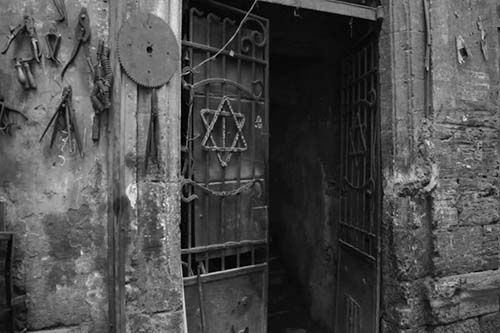

Jews leaving Egypt carrying the wealth of the land that enslaved them, rejoicing in their liberation and knowledge of how they were spared the 10 plagues and freed from bondage by God; this image is vividly painted for us in the Haggadah as it is read during the Passover Seder. It becomes for us as hard to believe as the wicked son does of miracles that Jews would fight being forced out of Egypt during the 20th century.
Yet after the Alhambra Decree ordering their expulsion from Spain in 1492, Sephardi and Karaite Jews (followers of only the Tanakh) emigrated back to Egypt and thrived there, joined by Jews from the Ottoman Empire, Italy and Greece. In later centuries, Ashkenazi Jews also returned to escape the pogroms in the latter part of the 19th century. By 1919, almost 80,000 Jews lived in Egypt, with about 10 percent having citizenship and many embracing a political life, eschewing Zionism.
“Jews of Egypt,” a 95-minute Egyptian documentary film in Arabic and French, produced by Haitham El-Khameesy, directed by Amir Ramses, and co-written and researched by Mostafa Youssef, recounts the history of the Jewish people in Egypt during the first half of the 20th century.
It begins with an introduction by Mohamed Abu El-Ghar who authored the book Jews of Egypt: From Prosperity to Diaspora, who had participated in an attack of Jewish shops in Egypt in 1947 and continues with testimonials of exiled Egyptian Jews living in France as well as Essam Fawzi, a sociologist. The film highlights significant Jewish figures in Egyptian society, as well as artists, businessmen, activists and political figures and combines interviews with reproductions of print media, videos and other archival material.
According to the documentary, Egyptians had no problems with the Jews until 1936. Then, “being a Jew could become an accusation,” said an exile to France. The film recounts how centuries and generations of mutual respect and acceptance with significant contributions made in business and the arts unraveled in Egypt with the Arab-Jewish clash in then Palestine from 1936 to 1939, as well as the rise of Hitler’s influence. Young Egypt and the Society of Muslim Brothers led the antagonism, accusing Jews of destroying holy places and killing Arab women and children. Pogroms soon followed and by the late 1940s Jews were denied citizenship and were at the short end of a quota system for jobs. Jewish areas were bombed and riots against Jews numbered in the hundreds with property nationalized. And yet, testimonials of exiles state that they remained “sons of Egypt…our support never stopped,” said one woman.
It was then that Jews began another slower and far less joyous exodus, voluntarily at first, reducing the population by 40%, with many making their way to the newly founded State of Israel. Another string of events further demonized the Jews, the Egyptian Revolution of 1952, the Lavon Affair in 1954 (an Israeli operation designed to discredit Gamal Abdel Nasser) and the trilateral invasion during the 1956 Suez Crisis led by Britain, France and Israel. It was then that a proclamation was issued stating that Jews were enemies of the state. Half of the remaining Jewish population, 25,000 people, were forced to declare they were departing and leaving their assets of their own free will. More than 1,000 were imprisoned and tortured along with British and French nationals. About 35,000 followed in exodus.
According to the film, with this expulsion, Egyptian society escalated its prejudices and taboos of all outsiders and could not distinguish between Jew, Israeli or Zionist.
A review in The Majalla, The Leading Arab Magazine, states, “Jews of Egypt becomes an important historical lesson, stirring up many valuable thoughts on Egyptian identity and how it was, and continues to be, affected by a variety of emerging political or religious currents.”
The advertising of the documentary implies that what happened to the Jews was a matter of a change in Egyptian perception, and not a factor of Egyptian Jewish actions. It is “an attempt to understand the change in the identity of the Egyptian society that turned from a society full of tolerance and acceptance of one another to a rejection of the minorities. How did the Jews of Egypt turn in the eyes of Egyptians from partners in the same country to enemies?”
Completed one year ago this month, the film obtained repeated Egyptian censorship and export approval and was well received at film festivals in Egypt, Germany, Palm Springs, Montreal, Sweden and Rotterdam. However, Egyptian National Security banned the theatrical screening of the documentary last month with no explanation. The producer of the film, Haitham Al Khamissi, wrote in a statement that this action is “aiming to terrorize the freedom of expression and to suppress creativity.”
By Anne Phyllis Pinzow











